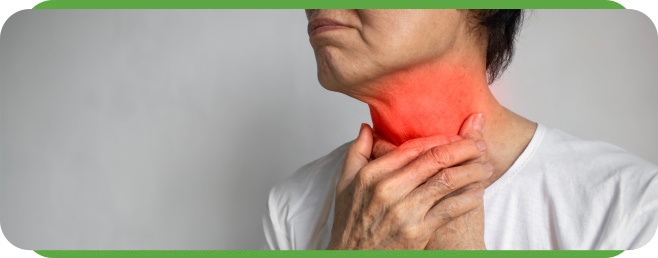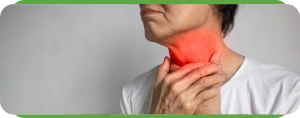Is Choking Caused by TMJ a Serious Health Concern?
Choking caused by TMJ disorder is rare but can occur if jaw misalignment leads to swallowing difficulties or airway obstruction. While not usually life-threatening, it can significantly impact quality of life. If you experience frequent choking or related symptoms, it’s important to seek help from an expert at the Koala Center For Sleep & TMJ Disorders. For more information, please contact us today or request an appointment online now! We have convenient locations in Bloomington IL, Peoria/Dunlap IL, El Paso TX, and Wausau WI.


Table of Contents:
Can TMJ cause choking or a sensation of choking?
How does TMJ lead to difficulty swallowing or choking?
Is there a connection between TMJ and throat tightness?
How can I manage choking symptoms caused by TMJ during meals?
Although a choking sensation is not a typical symptom of TMJ, muscle tension and discomfort in the jaw and throat, along with difficulty swallowing, are common. This can sometimes be mistaken for a choking sensation.
Rare but possible complications of TMJ can include a misalignment or dysfunction of the jaw muscles, which can affect the movement of the tongue and throat. This may interfere with swallowing, contributing to a choking sensation. Furthermore, TMJ can sometimes cause a condition known as Globus sensation, characterized by a persistent feeling of having a lump or something stuck in the throat.
If you’re experiencing a true choking sensation, especially if it’s accompanied by other symptoms like difficulty breathing or severe chest pain, it is crucial to seek immediate medical attention. These symptoms could indicate a more serious condition.
If you’re dealing with TMJ and have begun to experience a sensation of choking or any other concerning symptoms, it’s crucial to seek professional advice. Our healthcare providers at Koala Center For Sleep & TMJ Disorders can help identify the cause of your symptoms and recommend appropriate treatment options. These may include jaw exercises, physical therapy, or medications designed to mitigate the TMJ disorder and alleviate the choking sensation.
The temporomandibular joint plays a vital role in daily activities like speaking, chewing, and yawning. However, in cases of TMJ disorders, the normal function of the jaw and the surrounding muscles can be disrupted, impacting associated structures such as your esophagus, responsible for carrying food from your mouth to your stomach.
We recognize that TMJ disorders can extend beyond jaw discomfort or pain. Muscle tension, spasms, or discomfort can extend to your esophagus, leading to difficulty swallowing or dysphagia and even choking if the swallowing process is significantly impaired.
At Koala Center For Sleep & TMJ Disorders, we also acknowledge the influence of TMJ disorders on the nerves in the area, particularly the trigeminal nerve, and how this can impact the swallowing process. When the function of this nerve is disrupted, it can lead to complications such as choking.
Understanding the close anatomical and functional relationship between the jaw joint and the structures involved in swallowing is key to managing these complications. Our team provides a range of treatment options for TMJ disorders, from conservative measures such as physical therapy, an oral appliance, or lifestyle modifications.
Through years of experience, we recognize that TMJ can result in muscle spasms and tension not only in the jaw but also in the throat. We understand how the inflammation or issues in the temporomandibular joint can impact other areas of the body to which it is connected, such as the throat, causing discomfort or even difficulty swallowing.
At Koala, we are equipped to identify symptoms of TMJ-related throat tightness, such as a feeling of a lump in the throat, hoarseness, and throat pain. Moreover, we can recognize the postural changes that TMJ can cause, leading to muscle strain and consequent throat discomfort.
We encourage anyone experiencing these symptoms to seek our expert medical advice. We will work with you to rule out other underlying conditions such as anxiety, allergies, and certain infections. Once TMJ disorder is diagnosed, we offer a variety of treatments ranging from medication and physical therapy to the use of an oral appliance.
While TMJ disorder is a chronic condition with no definitive cure, our experts are committed to providing you with effective symptom management strategies and treatment recommendations to help alleviate any discomfort, including throat tightness.
At Koala Center For Sleep & TMJ Disorders, we frequently encounter patients suffering from temporomandibular joint (TMJ) disorders. These disorders are characterized by pain and dysfunction in the jaw joint and can sometimes lead to choking symptoms during meals. It’s crucial to manage these symptoms properly to ensure a comfortable and healthy eating experience.
Our dedicated team can assist you in effectively managing these symptoms by addressing the underlying TMJ issue. This could involve:
● Medical Treatment: Our healthcare professionals may prescribe medications to reduce inflammation and pain.
● Physical Therapy: Regular physical therapy exercises can help manage TMJ symptoms. These exercises can strengthen and relax your jaw muscles, improve flexibility, and reduce strain on your TMJ. Our physical therapists can provide personalized advice and guidance.
● Orthodontics: In certain cases, we may recommend orthodontic treatment to correct misaligned teeth and jawbones that exacerbate TMJ symptoms.
Alongside our tailored treatments, we encourage patients to take practical measures to minimize choking symptoms during meals:
● Eat Slowly and Mindfully: Create a relaxed and calm dining atmosphere. Take your time, chew your food thoroughly, and avoid rushing through meals.
● Cut Food into Small Pieces: Eating smaller bites can reduce the risk of choking.
● Avoid Hard or Chewy Foods: Foods that require excessive chewing can strain your TMJ and exacerbate symptoms.
● Stay Hydrated: Drinking plenty of fluids while eating can help manage choking symptoms.
● Try Puréed Foods: If chewing is particularly difficult, consider blending your meals into a smooth puree.
● Maintain a Good Posture: This helps keep your airways open.
● Use Straws: Straws can help you bypass any discomfort in your jaw.
● Identify and Avoid Trigger Foods: Keeping a food journal can help identify these triggers.
Remember, if your symptoms persist or worsen despite trying these methods, our team at Koala Center For Sleep & TMJ Disorders is ready to provide further advice and treatment options. If you experience any sudden or severe choking symptoms, seek medical attention immediately. Choking can be a life-threatening emergency and should be addressed promptly.

Additional Services You May Need
▸ KoalaKIDZzz®
▸ Sleep Apnea
▸ Snoring
▸ TMJ Disorder
▸ Fatigue
▸ Sleep Disorders
▸ Weight Loss
▸ CPAP Alternative
▸ Oral Appliances




